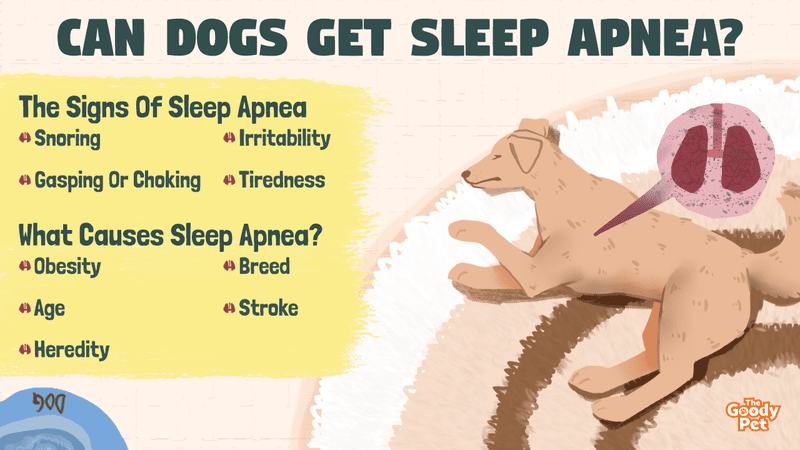If your dog tends to get very uncomfortable in its sleep due to breathing issues, you might be scared. And that fear is for a good reason. Apnea or airway obstruction during sleep can be deadly, but is it possible for dogs to have it?
Dogs can have sleep apnea, just like humans do. It is a pretty dangerous condition as it results from a partial or complete obstruction of your canine buddy’s airways. In severe cases, death could even occur.
Would you like to know more about this condition, its effects, and how to curb it? If yes, please keep reading as I have discussed these and more in this article.
What Is Sleep Apnea?
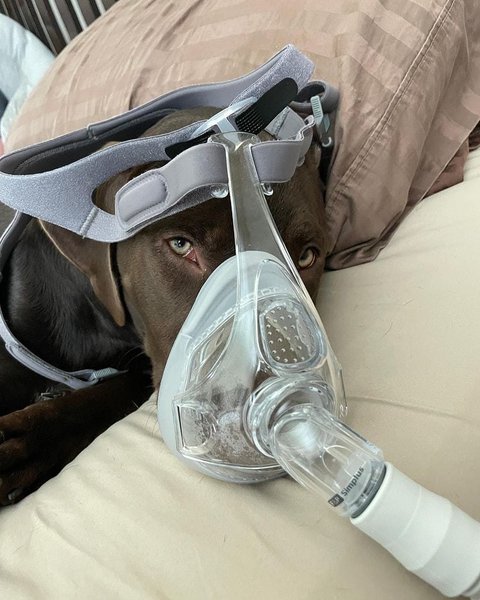
Sleep apnea is a condition caused by the partial or complete obstruction of your dog’s airways, leading to difficulties in breathing.
You may be familiar with the condition associated with humans, but sleep apnea can be as threatening in dogs as in animals. When your pup isn’t getting as much air as it needs when it sleeps, its body will immediately respond by waking it up to reposition and consciously try to breathe.
Although sleep apnea is not contagious, this doesn’t make it any less dangerous. In deep sleep conditions, it’s particularly fatal and could cause the untimely demise of your animal without proper warning.
What Are The Types Of Sleep Apnea?
There are three types of sleep apnea in dogs — obstructive sleep apnea, central sleep apnea, and complex sleep apnea.
Please join me as I explain them below.
Obstructive Sleep Apnea
Obstructive Sleep Apnea, OSA, is the most common form of apnea that affects dogs. It occurs when the airway of your animal temporarily becomes obstructed when it sleeps.
In some dogs, the trachea — the only pathway of air through the throat — can become blocked by tissue like the tonsils when the muscles relax. But this relaxation usually occurs when your canine buddy is asleep.
In addition, when this obstruction happens, your dog would jerk awake in response to lack of air. In some cases, especially when the trachea is blocked partially, your pup will still stay asleep but make loud, disturbing noises.
Central Sleep Apnea
Central sleep apnea is a more complicated kind of sleep apnea. It’s even worse than obstructive sleep apnea because your dog can barely control it.
Central sleep apnea occurs when your pooch’s brain doesn’t correctly send signals responsible for controlling muscle movement in the trachea. This means that your dog could have sessions where it will be unable to breathe because the brain hasn’t told its respiratory muscles to adjust to allow air passage.
As with obstructive sleep apnea, central sleep apnea could cause your canine buddy to wake up frequently to catch a breath. Sometimes, if your dog suffers from this condition, it could make noises while asleep. But in rare cases, unlike obstructive sleep apnea, it won’t.
Complex Sleep Apnea
As its name implies, complex sleep apnea is a more complicated version of sleep apnea in canines. It occurs when there is no observable obstruction in the air pathways of your pooch, but it keeps being unable to breathe.
Complex sleep apnea is a very rare condition in dogs and is characterized by multiple episodes of breathlessness. Very few cases have been diagnosed because most don’t classify as complex. Some breathing disorders are just severe cases of central sleep apnea.
Can All Dogs Have Sleep Apnea?
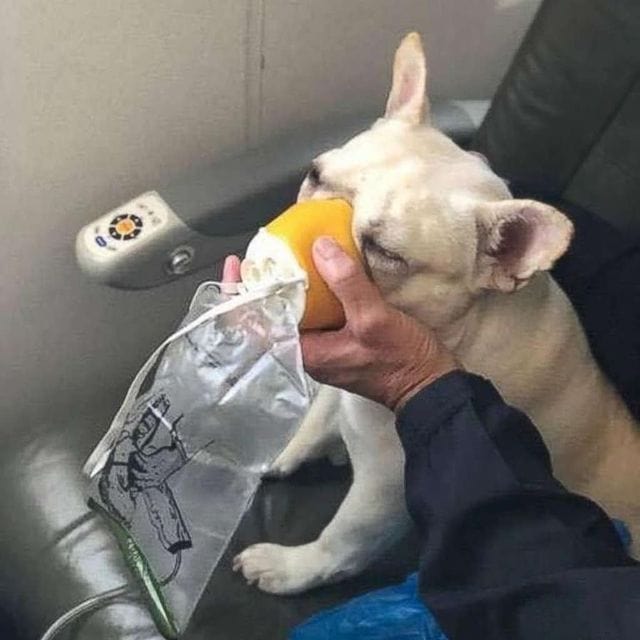
All dogs can have sleep apnea. Nonetheless, some breeds of dogs are more likely to suffer from it than others.
Still, all dogs can have sleep apnea because of certain factors, like obesity, that aren’t peculiar to any breed. Join me as I show you which dogs are more likely to have sleep apnea.
Are Some Breeds Of Dogs More Susceptible To Sleep Apnea Than Others?
Some dog breeds are more susceptible to sleep apnea than other dogs. Brachycephalic dogs such as Pugs, Boston Terriers, and Bulldogs are more likely to develop the condition than other dogs.
Brachycephalic dogs are dogs with short noses. Unlike other dogs with relatively long muzzles that make their airways longer, brachycephalic dogs have very short muzzles with cute wide nostrils.
While this isn’t usually a bad thing, you would feel sad that its anatomy would put your pup at such a disadvantage with the onset of sleep apnea.
Although obstructed airways can be hard to detect, studies have shown that it’s relatively easier for dogs with short noses to have them than other dogs.
How Can I Tell If My Dog Has Sleep Apnea?
There are several symptoms of sleep apnea in dogs. You could tell that your dog has sleep apnea if it snores loudly and gasps or makes choking sounds while asleep.
Snoring
When your dog snores, it doesn’t necessarily mean it has sleep apnea. Perhaps it may not be positioned well as it sleeps.
But if the snoring becomes frequent and results in waking up from time to time, it most likely has sleep apnea.
Every time your dog snores, it’s because of an obstruction in its airways. So, tissue in the throat could overlap the airways when the muscles of the trachea relax and make it difficult for your dog to sleep normally.
Furthermore, of all the types of sleep apnea, obstructive sleep apnea causes more snoring.
Gasping Or Choking
Your dog won’t make gasping or choking sounds if it can breathe properly. So, regardless of the kind of apnea it’s suffering from, it will make these noises.
But when it makes these noises, it’s mostly an indication of a more severe kind of apnea, such as central sleep apnea.
Because the throat muscles would be unable to draw in air normally, your dog would gasp unintentionally in its sleep. After a while, it would wake up.
Irritability
Just as with humans, your dog would become extremely irritable when deprived of the sleep it needs to perform well in the daytime.
Sleep apnea makes sleep so uncomfortable that your dog could even spend the night waking you up intermittently. Imagine not being able to breathe when you need to sleep so badly. How friendly would you be the next day?
Tiredness
Of course, tiredness is another symptom of sleep apnea. If you don’t get enough sleep, you will barely have enough energy to go through the next day.
It’s the same thing with your dog. It will even try to get some sleep in the daytime. But this would be fruitless as sleep apnea isn’t exactly nocturnal. The same conditions that cause this abnormality can occur during the day.
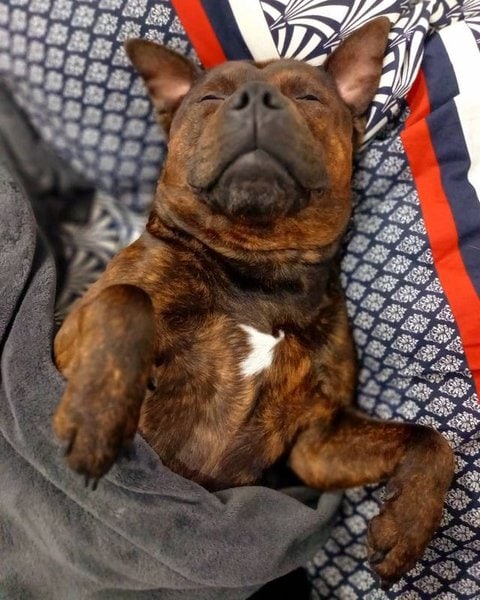
Why Does My Dog Sound Like It Can’t Breathe While Sleeping?
If your dog sounds like it can’t breathe while sleeping, it could be because of sleep apnea. Obstructions in its airways could make your pooch gasp for air while asleep.
If it’s not too severe, it would wake up and try to get some air. In bad cases where your canine buddy is too tired to move, the repercussions could be grave.
Is It Normal For Dogs To Snore?
It’s not normal for dogs to snore. Snoring is an indication that your dog has an obstruction that makes it unable to breathe properly.
In addition, while acute snoring might not be caused by sleep apnea, repetitive snoring is a very clear indicator of obstructive sleep apnea.
Why Does My Dog’s Breathing Sound Wheezy?
Your dog’s breathing could sound wheezy due to a variety of reasons ranging from tiredness to respiratory illness to sleep apnea.
If it sounds wheezy during the daytime, especially with its tongue out, it could be because of a quick sprint or rigorous exercise is engaged in. It could also be because it has a recurrent respiratory issue.
But if your dog’s breath only sounds wheezy when it sleeps, then obstructive apnea is the likely culprit.
What Causes Sleep Apnea?
Sleep apnea, especially obstructive sleep apnea, could be caused by various reasons. These reasons range from obesity to age, heredity, breed, and even stroke.
Please join me as I take a more in-depth look below.
Obesity
Obesity is one of the prevalent causes of obstructive sleep apnea. If your dog is obese, there are more chances that the fat in the neck could collapse on the trachea when it lies down.
Age
Age is linked to sleep apnea in different ways. For instance, as your dog grows older, its skin and tissues begin to loosen and droop on its body. If this happens to the skin and tissues on the neck of your dog, then they’ll most likely block its airways.
Furthermore, age is also a factor that causes central sleep apnea. As your dog grows older, its cells die, and its body doesn’t function at peak levels anymore. So, there are high chances that the brain could glitch and not send signals to important organs. It’s a scary condition.
Heredity
Heredity plays a huge role in determining whether your dog will be susceptible to sleep apnea or not. If your canine companion comes from a family of dogs with narrow airways, it has a higher predisposition to the condition than other dogs.
This predisposition is because the airway in which tissue can overlap would be very small, meaning that there are chances that it will suffer from complete obstruction.
Furthermore, if your dog’s parents are thick-necked, the chances of your dog having sleep apnea will be higher. So when the neck is dense with tissues and skin, with the airways just below them, things don’t look so good for it.
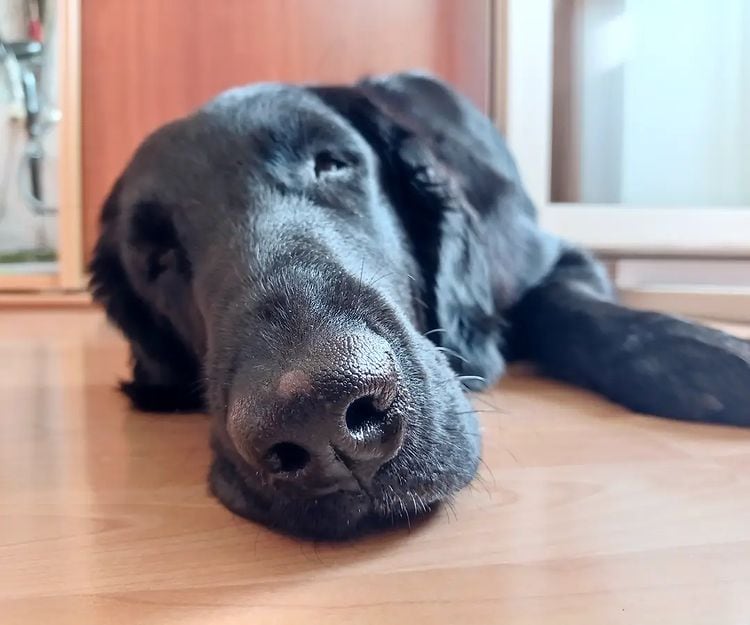
Breed
As aforementioned, brachycephalic dogs have a higher chance of suffering from obstructive sleep apnea than other dogs. They tend to have smaller noses, making it easy for the airways to be obstructed. How, you may ask? Well, even top scientists find it hard to conclude.
But research proves that their unique nasal structures play a huge role in their higher predisposition to the condition.
Stroke
It’s quite rare for dogs to have strokes, and so is it for them to have complex sleep apnea. If your dog suffers from a stroke, then you shouldn’t rule out horrible episodes of central sleep apnea out of its effects.
What Could Happen If My Dog Has Sleep Apnea?
There are a couple of effects that could arise from sleep apnea. They range from daytime fatigue to cardiovascular issues.
Fatigue
It doesn’t take critical thinking to conclude that sleep apnea results in your dog having fatigue when it wakes up eventually. Just like humans, dogs become weak when they are sleep-deprived.
Sadly, apart from not being able to sleep continuously, the constant struggle to breathe while suffering from apnea episodes can strain your pooch. This strain could eventually make it very tired in the morning.
Abnormal Metabolism
Dogs have a specific pattern which all metabolic activities follow. An alteration in this pattern due to a neglected factor can lead to negative consequences. When your pooch’s body doesn’t get as much rest as it needs, it will consume more energy while making your dog feel tired.
Also, the body would reduce the level of insulin circulating the blood to raise blood sugar levels and, consequently, its energy levels. If your dog doesn’t burn off the excess sugar, this could lead to diabetes.
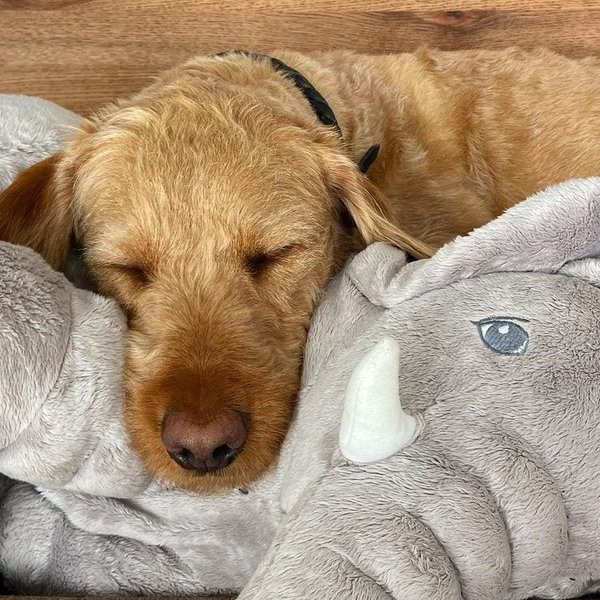
Cardiovascular Problems
Your pooch might suffer from cardiovascular problems depending on the severity of the apnea. Obstructive sleep apnea can reduce respiration rates which can also lower blood oxygenation rates.
This would slightly increase blood pressure levels leading to other cardiovascular issues.
But if your pooch suffers from central sleep apnea, blood pressure levels would increase very rapidly, causing your dog to have heart attacks.
Can My Dog Die From Sleep Apnea?
Your furry friend can die from sleep apnea if it suffers from a severe form of the condition.
Complicated sleep apnea, like central and complex sleep apnea, can cause fatalities. Complex sleep apnea results from several episodes of central sleep apnea, where the brain cuts off respiration by not giving feedback to the respiratory organs. In this case, even though your dog wakes up, it will have a hard time breathing.
Sadly, when your pooch is too tired to breathe because of the stress from several episodes, it will give up.
Furthermore, obstructive sleep apnea can be just as bad as other kinds of sleep apnea. If your dog has a lot of fatty tissue that overlaps the trachea, then it’s possible for it to obstruct airflow completely. If your dog is too weak to stand, it will suffer from asphyxiation.
How Do You Fix A Dog With Sleep Apnea?
You can correct sleep apnea to certain degrees based on the kind that your dog is different from. Engaging in weight control, cardiovascular exercises, taking prescribed medication, and undergoing surgery are ways of fixing sleep apnea in your dog.
Weight Control
Obstructive sleep apnea is linked to obesity in most cases. If your dog is overweight and suffers from sleep apnea, you should control the amount of food it eats.
In addition, consider altering its diet to low-fat food that digests easily. If it isn’t an active dog, then it’s best you just cut down the amount of food it eats.
However, it’s best to do this in a gradual manner to allow your dog and its body to adapt to the metabolism change.
Cardiovascular Exercises
Cardiovascular exercises like taking your dog on a walk and running go a long way in improving blood flow and keeping your dog sharp.
If your dog suffers from central sleep apnea, these exercises will keep the brain active and reduce the rate at which it glitches. Thus, there would be lower chances of your pooch suffering from centrally cut airflow.
Furthermore, these exercises can help your dog cut down useless weight in the neck that would otherwise choke it out.
Prescribed Medication
It’s best to take your dog to a vet when it suffers from episodes of sleep apnea. An in-depth examination would be taken in the vet clinic, and medication would be prescribed.
It would be best to avoid giving your dog sleep medication to make it sleep better. Because if its airways are obstructed, and it comes awake from time to time to breathe, then sleeping might as well cause its demise.
Surgery
In severe cases of sleep apnea, where the tissue in the throat area is too big that it keeps blocking the trachea, surgery is often the only way out.
Tonsillectomy and palatoplasty are common medical procedures used to extract excess tissue in canines. And only qualified vets should be allowed to perform these delicate procedures.
Can Sleep Apnea Go Away By Itself?
Sleep apnea doesn’t just go away on its own. But if your dog starts living a more healthy lifestyle and cuts down weight on its own, then it will go.
But most times, it takes conscious effort, both from you and your furry friend, for these to happen. So technically, sleep apnea doesn’t go away on its own.
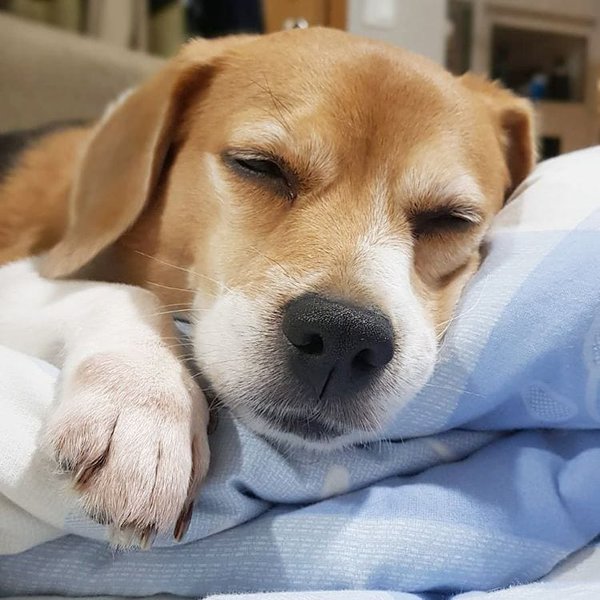
How To Prevent Your Dog From Having Sleep Apnea
Preventing your dog from having sleep apnea is almost impossible, especially if it’s heredity and breed issues that cause it.
But if the apnea is weight and stress-related, here are a few tips that will help keep your dog from having these scary episodes:
Keep Your Dog Active
Active doggies are less likely to develop sleep apnea than others. This reduced disposition is because their brains will not only be more active, but they will also be less likely to develop cardiovascular issues.
Keep Tabs On Your Dog’s Weight
If you consciously take steps to cut down your dog’s weight, then the chances of it having sleep apnea will reduce too.
Take Your Dog For Regular Health Checks
If large tissues that could obstruct your dog’s airways are identified on time, then the surgery could be conducted without your pooch suffering from any breathless episodes.

